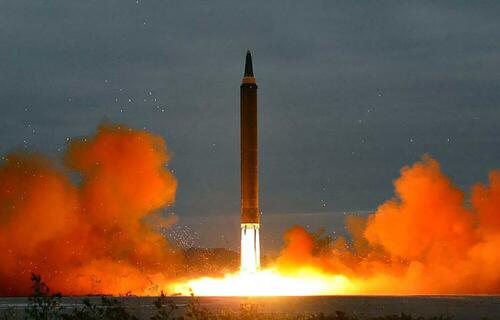
Authored by Judith Bergman via The Gatestone Institute,
-
China's urging "flexibility" on North Korea appears to coincide with the Chinese Communist Party's ambitions in the region.
-
"According to unclassified intelligence reports to Congress, there are five key Chinese banks and a specially created holding company that funds the North Korean missile and nuclear technology programs." — Peter Huessy, Real Clear Defense, August 10, 2017.
-
China's main strategic concern when it comes to the Korean peninsula is apparently to end the US presence there and keep it out of US hands so that China can finally establish itself as the hegemon in the region.
-
North Korean escalation in the form of increased missile tests and resumption of ICBM and nuclear tests to pressure the US to make concessions -- in the shape of troop withdrawals from South Korea -- would play directly into the hands of China, enabling it to replace the US and establish itself as the primary power in the region.
-
"They are looking to take actions, which we believe are fundamentally destabilizing, as a way to increase pressure." — US official in Washington to journalists, France24.com, January 31, 2022.
-
China, however, seems to have no interest in cooperating with the US on North Korea. Attempts to secure "Beijing's cooperation" to build necessary economic leverage over North Korea are therefore exercises in futility.
-
China clearly cannot be relied on voluntarily to use its leverage over North Korea to persuade Kim Jong-un to give up his missile and nuclear program. To resolve the impasse, it is necessary to employ means that will leave China no choice other than to cooperate on North Korea.
-
A highly efficient way of doing that, Gordon Chang has suggested, would be to cut off the large Chinese banks and businesses that support the North Korean missile and nuclear technology from the global financial system by designating them a "primary money laundering concern" under Section 311 of the Patriot Act.
-
"In short, American policymakers know how to get China to begin acting responsibly." — Gordon G. Chang, Newsweek, May 10, 2021.
-
The question now is -- will the Biden administration muster the political will to designate those large Chinese banks under Section 311 of the Patriot Act?
North Korea, despite a UN Security Council ban on its ballistic missile tests, continued to develop its nuclear and missile programs in 2021, according to a new UN report. In January 2022 alone, North Korea launched a record 11 missiles, including two hypersonic missiles and the first firing since 2017 of a Hwasong-12 mobile intermediate-range ballistic missile which is within reach of US territory with its estimated range of 4,500 kilometers. In 2017, North Korea tested the Hwasong-15, which has an estimated range of 8,500-13,000 kilometers.
Both US and South Korean officials expressed concern that the Hwasong-12 test indicated that North Korea would resume testing of intercontinental ballistic missiles (ICBMs) and nuclear weapons.
In addition, North Korea reportedly has an underground military base, used for keeping ICBMs, just 25 kilometers from its border with China. According to analysts from the Center for Strategic and International Studies (CSIS), the location was chosen to deter preemptive strikes by the US against the base, to avoid provoking Beijing. "The position near the Chinese border acts as a potential deterrent to a pre-emptive strike that might impinge on Chinese security equities," noted Victor Cha, a North Korea expert at the CSIS.
"In today's world where many countries waste time dealing with the United States with submission and blind obedience, there's only our country on this planet that can shake the world by firing a missile with the U.S. mainland in its range," North Korea's Foreign Ministry said in a statement. "There are more than 200 countries in the world, but only a few have hydrogen bombs, intercontinental ballistic missiles, and hypersonic missiles." North Korea has said in the past that the Hwasong-12 can carry a "large-size heavy nuclear warhead."
Eight Security Council members -- the United States, Albania, Brazil, France, Ireland, Norway, the United Arab Emirates and Britain -- and Japan described North Korea's Hwasong-12 launch as a "significant escalation" that "seeks to further destabilize the region."
China, on the other hand, urged "flexibility" on North Korea. "They should come up with more attractive and more practical, more flexible approaches, policies and actions in accommodating concerns" of North Korea, Chinese UN Ambassador Zhang Jun said. "The key in solving this issue is already in the hands of the United States."
China's urging "flexibility" on North Korea appears to coincide with the Chinese Communist Party's ambitions in the region. North Korea's recent actions were possibly even encouraged by China.
"China, after all, exercises great influence over the North's ruling Kim family and can, as a practical matter, require the North Koreans to do what it wants," wrote China expert Gordon G. Chang.
According to some analysts, China has been instrumental in bringing about North Korea's nuclear weapons' program. According to Peter Huessy, director of strategic deterrent studies at the Mitchell Institute for Aerospace Studies:
"The North Korean nuclear program started in 1965 with the Soviet construction of a 5-megawatt nuclear reactor. But it was Chinese and Pakistani assistance that enabled the North to begin construction on a 50-megawatt reactor at Yongbyon, and a secret reprocessing facility, in the mid-1980s. North Korean construction of a covert uranium enrichment facility around 2000 and North Korea's first test explosion of a nuclear device in 2006 were likely enabled by assistance from the Pakistani A.Q. Khan, and based on uranium enrichment and nuclear design plans originally obtained from China."
Crucially, according to Huessy:
"According to unclassified intelligence reports to Congress, there are five key Chinese banks and a specially created holding company that funds the North Korean missile and nuclear technology programs."
China's main strategic concern when it comes to the Korean peninsula is seemingly to end the US presence there and keep it out of US hands so that China can finally establish itself as the hegemon in the region. There are currently approximately 28,500 American troops stationed in South Korea. That is the third-largest military presence abroad for the US after Japan and Germany. North Korean escalation in the form of increased missile tests and resumption of ICBM and nuclear tests to pressure the US to make concessions -- in the shape of troop withdrawals from South Korea -- would play directly into the hands of China, enabling it to replace the US and establish itself as the primary power in the region.
"North Korea will likely escalate pressure on the United States by taking a series of steps toward an ICBM test," said Cheon Seong-whun, a former head of the Korea Institute for National Unification, a government-funded research institute in Seoul.
"They are looking to take actions, which we believe are fundamentally destabilizing, as a way to increase pressure," a US official in Washington told journalists.
In response to North Korea's test of the Hwasong-12, the US has called for direct talks with the country "without preconditions."
"We believe it is completely appropriate and completely correct to start having some serious discussions... It requires a response. You will see us taking some steps that are designed to show our commitment to our allies ... and at the same time we reiterate our call for diplomacy. We stand ready and we are very serious about trying to have discussions that address concerns on both sides."
If the Biden administration wants to resolve the growing North Korean threat, it will have to start doing things differently. It will have to abandon "the same basic North Korea strategy that Washington has used for over two decades," as pointed out by Markus Garlauskas, a nonresident senior fellow at the Atlantic Council's Scowcroft Center for Strategy and Security, who served nearly 20 years in the U.S. government dealing with North Korea.
"This strategy has focused on achieving a 'strategic decision' from Pyongyang to negotiate an end to its nuclear weapons program and on securing Beijing's cooperation to build the necessary economic leverage."
China, however, seems to have no interest in cooperating with the US on North Korea. Attempts to secure "Beijing's cooperation" to build necessary economic leverage over North Korea are therefore exercises in futility. A new strategy must finally acknowledge China's role as backer of North Korea for the Chinese Communist Party's strategic purposes in the region. China clearly cannot be relied on voluntarily to use its leverage over North Korea to persuade Jong-un to give up his missile and nuclear program. To resolve the impasse, it is necessary to employ means that will leave China no choice other than to cooperate on North Korea. A highly efficient way of doing that, Gordon Chang has suggested, would be to cut off the large Chinese banks and businesses that support the North Korean missile and nuclear technology from the global financial system by designating them a "primary money laundering concern" under Section 311 of the Patriot Act.
"And as big as Bank of China is—it is the world's fourth-largest bank, as measured by assets—it is surely not the largest Chinese bank cleaning up cash for Kim," Gordon Chang wrote.
"That honor may belong to China's—and the world's—largest bank, the Industrial and Commercial Bank of China. Moreover, the remaining two of the Big Four, the world's second- and third-largest banks, have also been implicated in handling dirty money for the Kims. In short, American policymakers know how to get China to begin acting responsibly."
The question now is – will the Biden administration muster the political will to designate those large Chinese banks under Section 311 of the Patriot Act?
Authored by Judith Bergman via The Gatestone Institute,
-
China’s urging “flexibility” on North Korea appears to coincide with the Chinese Communist Party’s ambitions in the region.
-
“According to unclassified intelligence reports to Congress, there are five key Chinese banks and a specially created holding company that funds the North Korean missile and nuclear technology programs.” — Peter Huessy, Real Clear Defense, August 10, 2017.
-
China’s main strategic concern when it comes to the Korean peninsula is apparently to end the US presence there and keep it out of US hands so that China can finally establish itself as the hegemon in the region.
-
North Korean escalation in the form of increased missile tests and resumption of ICBM and nuclear tests to pressure the US to make concessions — in the shape of troop withdrawals from South Korea — would play directly into the hands of China, enabling it to replace the US and establish itself as the primary power in the region.
-
“They are looking to take actions, which we believe are fundamentally destabilizing, as a way to increase pressure.” — US official in Washington to journalists, France24.com, January 31, 2022.
-
China, however, seems to have no interest in cooperating with the US on North Korea. Attempts to secure “Beijing’s cooperation” to build necessary economic leverage over North Korea are therefore exercises in futility.
-
China clearly cannot be relied on voluntarily to use its leverage over North Korea to persuade Kim Jong-un to give up his missile and nuclear program. To resolve the impasse, it is necessary to employ means that will leave China no choice other than to cooperate on North Korea.
-
A highly efficient way of doing that, Gordon Chang has suggested, would be to cut off the large Chinese banks and businesses that support the North Korean missile and nuclear technology from the global financial system by designating them a “primary money laundering concern” under Section 311 of the Patriot Act.
-
“In short, American policymakers know how to get China to begin acting responsibly.” — Gordon G. Chang, Newsweek, May 10, 2021.
-
The question now is — will the Biden administration muster the political will to designate those large Chinese banks under Section 311 of the Patriot Act?
North Korea, despite a UN Security Council ban on its ballistic missile tests, continued to develop its nuclear and missile programs in 2021, according to a new UN report. In January 2022 alone, North Korea launched a record 11 missiles, including two hypersonic missiles and the first firing since 2017 of a Hwasong-12 mobile intermediate-range ballistic missile which is within reach of US territory with its estimated range of 4,500 kilometers. In 2017, North Korea tested the Hwasong-15, which has an estimated range of 8,500-13,000 kilometers.
Both US and South Korean officials expressed concern that the Hwasong-12 test indicated that North Korea would resume testing of intercontinental ballistic missiles (ICBMs) and nuclear weapons.
In addition, North Korea reportedly has an underground military base, used for keeping ICBMs, just 25 kilometers from its border with China. According to analysts from the Center for Strategic and International Studies (CSIS), the location was chosen to deter preemptive strikes by the US against the base, to avoid provoking Beijing. “The position near the Chinese border acts as a potential deterrent to a pre-emptive strike that might impinge on Chinese security equities,” noted Victor Cha, a North Korea expert at the CSIS.
“In today’s world where many countries waste time dealing with the United States with submission and blind obedience, there’s only our country on this planet that can shake the world by firing a missile with the U.S. mainland in its range,” North Korea’s Foreign Ministry said in a statement. “There are more than 200 countries in the world, but only a few have hydrogen bombs, intercontinental ballistic missiles, and hypersonic missiles.” North Korea has said in the past that the Hwasong-12 can carry a “large-size heavy nuclear warhead.”
Eight Security Council members — the United States, Albania, Brazil, France, Ireland, Norway, the United Arab Emirates and Britain — and Japan described North Korea’s Hwasong-12 launch as a “significant escalation” that “seeks to further destabilize the region.”
China, on the other hand, urged “flexibility” on North Korea. “They should come up with more attractive and more practical, more flexible approaches, policies and actions in accommodating concerns” of North Korea, Chinese UN Ambassador Zhang Jun said. “The key in solving this issue is already in the hands of the United States.”
China’s urging “flexibility” on North Korea appears to coincide with the Chinese Communist Party’s ambitions in the region. North Korea’s recent actions were possibly even encouraged by China.
“China, after all, exercises great influence over the North’s ruling Kim family and can, as a practical matter, require the North Koreans to do what it wants,” wrote China expert Gordon G. Chang.
According to some analysts, China has been instrumental in bringing about North Korea’s nuclear weapons’ program. According to Peter Huessy, director of strategic deterrent studies at the Mitchell Institute for Aerospace Studies:
“The North Korean nuclear program started in 1965 with the Soviet construction of a 5-megawatt nuclear reactor. But it was Chinese and Pakistani assistance that enabled the North to begin construction on a 50-megawatt reactor at Yongbyon, and a secret reprocessing facility, in the mid-1980s. North Korean construction of a covert uranium enrichment facility around 2000 and North Korea’s first test explosion of a nuclear device in 2006 were likely enabled by assistance from the Pakistani A.Q. Khan, and based on uranium enrichment and nuclear design plans originally obtained from China.”
Crucially, according to Huessy:
“According to unclassified intelligence reports to Congress, there are five key Chinese banks and a specially created holding company that funds the North Korean missile and nuclear technology programs.”
China’s main strategic concern when it comes to the Korean peninsula is seemingly to end the US presence there and keep it out of US hands so that China can finally establish itself as the hegemon in the region. There are currently approximately 28,500 American troops stationed in South Korea. That is the third-largest military presence abroad for the US after Japan and Germany. North Korean escalation in the form of increased missile tests and resumption of ICBM and nuclear tests to pressure the US to make concessions — in the shape of troop withdrawals from South Korea — would play directly into the hands of China, enabling it to replace the US and establish itself as the primary power in the region.
“North Korea will likely escalate pressure on the United States by taking a series of steps toward an ICBM test,” said Cheon Seong-whun, a former head of the Korea Institute for National Unification, a government-funded research institute in Seoul.
“They are looking to take actions, which we believe are fundamentally destabilizing, as a way to increase pressure,” a US official in Washington told journalists.
In response to North Korea’s test of the Hwasong-12, the US has called for direct talks with the country “without preconditions.”
“We believe it is completely appropriate and completely correct to start having some serious discussions… It requires a response. You will see us taking some steps that are designed to show our commitment to our allies … and at the same time we reiterate our call for diplomacy. We stand ready and we are very serious about trying to have discussions that address concerns on both sides.”
If the Biden administration wants to resolve the growing North Korean threat, it will have to start doing things differently. It will have to abandon “the same basic North Korea strategy that Washington has used for over two decades,” as pointed out by Markus Garlauskas, a nonresident senior fellow at the Atlantic Council’s Scowcroft Center for Strategy and Security, who served nearly 20 years in the U.S. government dealing with North Korea.
“This strategy has focused on achieving a ‘strategic decision’ from Pyongyang to negotiate an end to its nuclear weapons program and on securing Beijing’s cooperation to build the necessary economic leverage.”
China, however, seems to have no interest in cooperating with the US on North Korea. Attempts to secure “Beijing’s cooperation” to build necessary economic leverage over North Korea are therefore exercises in futility. A new strategy must finally acknowledge China’s role as backer of North Korea for the Chinese Communist Party’s strategic purposes in the region. China clearly cannot be relied on voluntarily to use its leverage over North Korea to persuade Jong-un to give up his missile and nuclear program. To resolve the impasse, it is necessary to employ means that will leave China no choice other than to cooperate on North Korea. A highly efficient way of doing that, Gordon Chang has suggested, would be to cut off the large Chinese banks and businesses that support the North Korean missile and nuclear technology from the global financial system by designating them a “primary money laundering concern” under Section 311 of the Patriot Act.
“And as big as Bank of China is—it is the world’s fourth-largest bank, as measured by assets—it is surely not the largest Chinese bank cleaning up cash for Kim,” Gordon Chang wrote.
“That honor may belong to China’s—and the world’s—largest bank, the Industrial and Commercial Bank of China. Moreover, the remaining two of the Big Four, the world’s second- and third-largest banks, have also been implicated in handling dirty money for the Kims. In short, American policymakers know how to get China to begin acting responsibly.”
The question now is – will the Biden administration muster the political will to designate those large Chinese banks under Section 311 of the Patriot Act?






